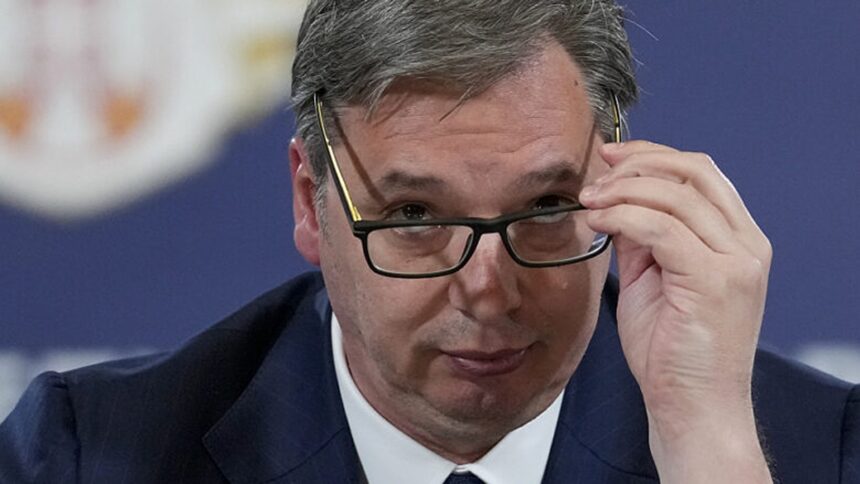Only people close to SNS will profit from the crisis
The case of the Petroleum Industry of Serbia (NIS) encapsulates a political era in which President Aleksandar Vučić pushed expectations to the limit with players far more serious than himself. Now comes the moment of reckoning—of measuring what, if anything, is left of the myth of a man who always “outsmarted” others. Just as Vučić’s circle profited from the collapse of EPS through coal imports, there is now every reason to expect that the same structures will profit from fuel imports as well.
A Deal Serbia Never Understood
“Neither did you know what you were selling, nor we what we were buying,” former Russian ambassador Aleksandar Konuzin once said at the Kopaonik Business Forum, referring to Serbia’s 2008 decision to sell a majority 51% stake in NIS to Gazprom for €400 million in a direct deal.
Seventeen years later, Serbia’s authorities still do not know what is being sold, under what conditions, or who the next majority owner might be of one of the country’s most strategically important companies—one that generates around 4% of GDP and pays one-tenth of all state revenues.
And yet, for the outcome of this crisis, Washington—not Belgrade—has the final say, as the United States insists on reducing Russia’s share in NIS to zero. If that does not happen, the refinery in Pančevo may soon shut down due to sanctions that took effect on 9 October and the lack of crude oil for processing. That would inevitably lead to fuel shortages and price hikes.
Even though prices are controlled by the government, the cost of Eurodiesel rose in a single month from 192 to 204 dinars, and gasoline from 176 to 183 dinars. And this is far from the highest price that Serbian citizens will pay for the government’s reckless political decisions.
The Enormous Price of Wrong Political Choices
“Wrong political decisions have cost every Serbian citizen between $660,000 and $1 million in lost GDP,” says Ivan Ostojić, expert on economics and innovation. Serbia would today have a GDP per capita similar to Poland, Slovakia, or the Czech Republic had it followed their economic path over the last three decades. Instead, it boarded “the wrong train,” and every station since has been a mistake.
Serbia now faces a similar crossroads—this time because of NIS and its energy dependence on Russia. Ostojić reminds that the 2008 NIS sale was an amateur political trade, fully supported by both the government and much of the opposition at the time, including the political predecessors of today’s ruling SNS.
The deal was designed not for Serbia’s energy security, but to buy Russian veto power over Kosovo in the UN—a transactional fantasy whose consequences Serbia is still paying for.
Vučić: A Decade of Manipulation and Miscalculation
Today, Vučić—the self-appointed “savior”—tries to shift the blame to the previous government, claiming they sold NIS cheaply. But the truth is clearer than ever:
- Vučić continued the same dependence on Moscow, amplifying it through propaganda.
- He destroyed every remnant of Serbian state presence in the north of Kosovo at the request of Western actors, while publicly promising Russians eternal loyalty.
- He humiliated himself repeatedly—first with the failed bet on Hillary Clinton, then by degrading Serbia in the 2020 Washington Agreement.
Even Donald Trump, initially willing to tolerate Vučić as another useful autocrat, eventually recognized the Serbian president’s duplicity. Trump now imposes the highest tariffs in the region on Serbia and sanctions NIS—all direct consequences of Vučić’s political games.
Meanwhile, Moscow has long seen through Vučić’s double dealings. The Kremlin knows:
- Serbia blocked Lavrov’s plane at Vučić’s own request to the Americans.
- Serbian ammunition ends up with Ukrainian forces.
- Vučić offers loyalty only when it benefits him personally.
Yet Russia tolerates him as long as Serbia remains a strategic platform for Russian influence.
A Government Cornered by Its Own Corruption
The mass protests following recent tragedies exposed the full extent of regime corruption and repression—realities Brussels ignored for over a decade while Vučić bartered Serbia’s democracy for silent EU support.
But now, with students and citizens in the streets and blatant violence by the government, Europe’s tolerance is wearing thin. Western pressure is intensifying, and the NIS crisis only amplifies the urgency.
Serbia as a Colony
“Srbija is now in the position of a colony,” Ostojić warns. The fate of its most important energy company is no longer in Serbian hands:
- Russia decides who buys NIS.
- The U.S. must approve the sale.
If the Pančevo refinery stops, the impact will cascade through the entire economy.
The government still pretends Serbia can “sit on four chairs,” waiting for problems to magically resolve themselves—an illusion that has already collapsed.
A New Opportunity for Corruption
Economist Goran Radosavljević offers another explanation for the delays around NIS: corruption.
When EPS collapsed under SNS management, Vučić’s associates profited massively from coal imports. Now, instead of diversifying energy routes, the government plans an unnecessary €150 million oil pipeline to Hungary, connecting Serbia even more tightly to Russian energy—another opportunity for politically connected actors to loot public money.
Serbia pays the highest fuel prices in Europe, largely because the state takes nearly 60% of the price through taxes and levies—another hidden cost of incompetent and predatory governance.
The Collapse of Vučić’s Myth
The NIS crisis exposes the end of the Vučić era.
For years, he ruled not by feeding the population or building prosperity, but by placing himself as the pivot between competing foreign powers—Russian, American, and European. Now, all sides are turning against him simultaneously:
- Trump imposes tariffs and sanctions.
- The EU reprimands him for repression and media censorship.
- Russia criticizes him openly and withholds support.
Serbia stands without allies, isolated and weakened.
As Boško Jakšić concludes, everything ends for Vučić as “double defeat”—double loss, double humiliation, double failure.
The bill has finally arrived.







